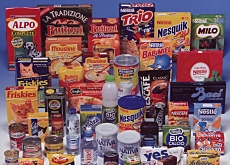Nestlé backtracks on Cailler packaging fiasco

The world's largest food company, Nestlé, will fix an expensive mistake by again repackaging a popular chocolate bar next year, reportedly in its original design.
Sales of Cailler confectionary plummeted after a disastrous rebranding exercise in February that fell foul of environmental groups, retailers and customers.
The media speculated at the weekend that the blunder may cost the boss of Nestlé Switzerland, Nelly Wenger, her job.
However, Nestlé told swissinfo they would welcome back Wenger, who is currently off work fighting cancer, while confirming the Cailler relaunch. But a company spokesman would not give details on the design of the new Cailler packaging, saying it would be “adapted”.
The decision by Wenger to commission star architect Jean Nouvel to design new packaging for Cailler, one of the oldest names in the Swiss chocolate industry, soon ran into problems.
A consumer association from French-speaking Switzerland, the FRC, criticised the packaging for containing a high proportion of non-recyclable PET plastic. Discount retailer Denner also took issue with the increased price of the sexed-up brand and stopped stocking Cailler chocolates.
Sales for the Cailler brand halved between mid-August and mid-September this year compared to 2005, prompting the company to backtrack. The SonntagsZeitung newspaper reported that chief executive and chairman Peter Brabeck has insisted that all such decisions come through him first in future.
Local problem
But Nestlé said Wenger will get her old desk back if and when she is well enough to resume her duties.
“It needs time and we hope that she can come back as quickly as possible once she is 100 per cent better,” spokesman Philippe Oertlé told swissinfo.
Oertlé added that the dispute with Denner had not yet reached resolution, but confirmed that some Cailler products would be reintroduced with new packaging early next year.
“If you make a relaunch with any brand then you first see how it is received by your customers. Sometimes you may have to make adaptations,” he said.
René Weber, an analyst at Bank Vontobel, told swissinfo that while the fiasco has caused public relations damage in Switzerland, it will not damage the firm’s worldwide performance.
“This has caused a negative impact in Switzerland because the Swiss cannot understand why such a big company could make the mistake of coming up with this type of packaging,” he said.
“But outside Switzerland it is a non-event because Switzerland makes up only about one per cent of total group sales, and only around 15 per cent of that business comes from chocolate.”
He added: “Every company has to innovate and sometimes it simply goes wrong.”
However, Weber added that Nestlé’s confectionary margins were still inferior to its main rivals, a fact that has already resulted in a significant restructuring of its British business.
Last week Nestlé reported a 9.1 per cent rise in total sales for the first nine months of this year to SFr72.2 billion ($57 billion).
swissinfo, Matthew Allen and agencies
Nestlé 2005 results:
Net profit: SFr7.995 billion ($6.32 billion)
Total sales: SFr91.07 billion (+7.5%)
Operating profit (Ebita): SFr11.72 billion (+8.9%)
Nestlé was founded in 1866 by Henri Nestlé and is now the world’s biggest food and beverage company.
The company employs around 247,000 people and has factories or operations in almost every country in the world.
The cost of repackaging the Cailler chocolate products is estimated to have run to SFr50-60 million ($39-47 million).
In its report into the Cailler rebranding, the FRC pointed out that the wrapping around 100g of Frigor chocolate, a popular Cailler product, weighs 50g.
PET stands for polyethylene terephthalate, a plastic resin and a form of polyester. Some forms of PET are recyclable, but not the type used for Cailler.
The house of Cailler was built in 1819 and has been part of the Nestlé group since 1929. It generates 12 per cent of the total sales of Nestlé Switzerland.
Nestlé also produces a number of other household products, such as Nescafé coffee and KitKat chocolate bars.

In compliance with the JTI standards
More: SWI swissinfo.ch certified by the Journalism Trust Initiative











You can find an overview of ongoing debates with our journalists here . Please join us!
If you want to start a conversation about a topic raised in this article or want to report factual errors, email us at english@swissinfo.ch.